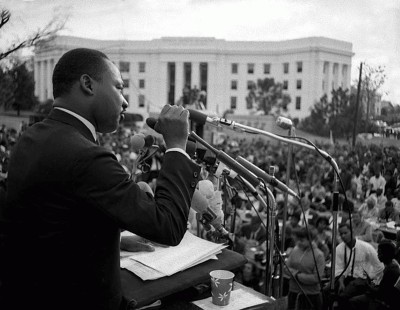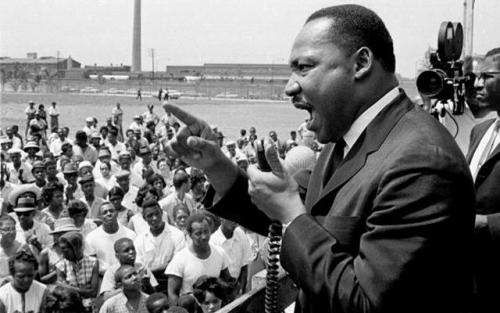The “I Have a Dream” Speech is perhaps the most famous speech delivered by Martin Luther King, Jr. The civil rights leader, however, delivered many speeches in his lifetime, on many different topics. Although known primarily for his advocacy for civil rights, he also had pointed public opinions on other topics of the day, including the war in Vietnam.
King, a skilled orator and author of a large number of political and religious speeches, evoked religious imagery in the speech. He said, “We have walked through desolate valleys and across the trying hills,” evoking the image of the Exodus of the ancient Israelites, as written in the Christian Bible. King also referenced the nation’s slavery past: “Again the brutality of a dying order shrieks across the land.” He continued his plea for nonviolence, even against those who professed hate: “Our aim must never be to defeat or humiliate the white man, but to win his friendship and understanding.” The speech gained its popular name from the rousing conclusion: "I know you are asking today, ‘How long will it take?’ Somebody's asking, ‘How long will prejudice blind the visions of men, darken their understanding, and drive bright-eyed wisdom from her sacred throne?’ Somebody's asking, ‘When will wounded justice, lying prostrate on the streets of Selma and Birmingham and communities all over the South, be lifted from this dust of shame to reign supreme among the children of men?’ Somebody's asking, ‘When will the radiant star of hope be plunged against the nocturnal bosom of this lonely night, plucked from weary souls with chains of fear and the manacles of death? How long will justice be crucified, and truth bear it?’ I come to say to you this afternoon, however difficult the moment, however frustrating the hour, it will not be long, because ‘truth crushed to earth will rise again.’ How long? Not long, because ‘no lie can live forever.’ How long? Not long, because ‘you shall reap what you sow. How long? Not long, because the arc of the moral universe is long, but it bends toward justice." King was awarded the Nobel Peace Prize on Dec. 10, 1964, in Oslo. In his acceptance speech, he mentioned the struggle that African-Americans had endured so far in their quest for equality: “I am mindful that debilitating and grinding poverty afflicts my people and chains them to the lowest rung of the economic ladder.” King also commented that he saw his being awarded the Peace Prize as a vindication of his choice to avoid violence: Citing the example of Mohandas Gandhi and others in India, King said, “I conclude that this award which I receive on behalf of that movement is a profound recognition that nonviolence is the answer to the crucial political and moral question of our time, the need for man to overcome oppression and violence without resorting to violence and oppression. Civilization and violence are antithetical concepts.”
“Surely this madness must cease. We must stop now. I speak as a child of God and brother to the suffering poor of Vietnam. I speak for those whose land is being laid waste, whose homes are being destroy, whose culture is being subverted. I speak for the poor in America who are paying the double price of smashed hopes at home, and dealt death and corruption in Vietnam. I speak as a citizen of the world, for the world as it stands aghast at the path we have taken. I speak as one who loves America, to the leaders of our own nation: The great initiative in this war is ours; the initiative to stop it must be ours.” The Vietnam War was fought against the backdrop of the Cold War, a worldwide struggle of ideologies pitting Communist nations of the world, primarily the Soviet Union and Eastern Europe, against non-Communist nations of the world, primarily the United States and Western Europe. In the “Beyond Vietnam” speech, King argued that the best weapon against communism was not violence but a revolution of values. In ending the speech, King evoked lofty ideals: “We must find new ways to speak for peace in Vietnam and justice throughout the developing world, a world that borders on our doors. If we do not act, we shall surely be dragged down the long, dark, and shameful corridors of time reserved for those who possess power without compassion, might without morality, and strength without sight.” The last public speech King ever gave has come to known as the “Mountaintop” speech. He delivered this speech on April 3, 1968, in Memphis, Tenn., the day before he was killed. In this rousing speech, King took listeners on a trip back through history, referencing the ancient Israelites, Greeks, and Romans, before including the high culture of the Renaissance, the brave religious disobedience of Martin Luther, and the political courage of President Abraham Lincoln in announcing the Emancipation Proclamation. King referenced the nonviolent protests that had become his hallmark: “We don't have to argue with anybody. We don't have to curse and go around acting bad with our words. We don't need any bricks and bottles.” He reminded listeners of the Selma-Montgomery Marches and of the Civil Rights Act and of the Voting Rights Act. He said that the work wasn’t done. King was in Memphis to draw attention to what many thought to be unfair treatment of that city’s sanitation workers, and King referenced that situation in his speech. He also made mention of totalitarian countries and their denial of certain basic freedoms, reminding listeners that the U.S. Constitution guarantees American certain rights: “Somewhere I read of the freedom of assembly. Somewhere I read of the freedom of speech. Somewhere I read of the freedom of press. Somewhere I read that the greatness of America is the right to protest for right.” In the windup to the speech, King speaks almost presciently of what was to come. (He was killed the next day.) “Well, I don't know what will happen now. We've got some difficult days ahead. But it really doesn't matter with me now, because I've been to the mountaintop. And I don't mind. Like anybody, I would like to live a long life. Longevity has its place. But I'm not concerned about that now. I just want to do God's will. And He's allowed me to go up to the mountain. And I've looked over. And I've seen the Promised Land. I may not get there with you. But I want you to know tonight, that we, as a people, will get to the promised land!” |
|
Social Studies for Kids
copyright 2002–2026
David White



 After the completion of the highly publicized
After the completion of the highly publicized  King drew harsh criticisms from some of his most ardent supports, including President Lyndon Johnson, for his outspoken opposition to the war in Vietnam. His most famous speech on the topic, “Beyond Vietnam,” came on April 4, 1967, in New York. Among other things, King had this to say about the ongoing conflict:
King drew harsh criticisms from some of his most ardent supports, including President Lyndon Johnson, for his outspoken opposition to the war in Vietnam. His most famous speech on the topic, “Beyond Vietnam,” came on April 4, 1967, in New York. Among other things, King had this to say about the ongoing conflict:
